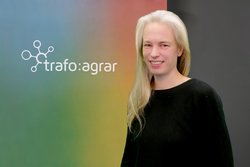Dr. Inga Willms
Research advisor
- Inter- and transdisciplinary research
- Acceptance research
- Renewable energies
- Environmental behavior

Seit 10/2022
Wissenschaftliche Mitarbeiterin an der Universität Vechta, Verbund Transformationsforschung agrar Niedersachsen (trafo:agrar)
- Projektentwicklung auf internationaler und nationaler Ebene
- Drittmittelakquise
05/2014-03/2022
Wissenschaftliche Mitarbeiterin an der Otto-von-Guericke-Universität Magdeburg
- Mitarbeiterin in den Abteilungen „Umweltpsychologie“ (2014-2017) und „Persönlichkeits- und Sozialpsychologie“ (2017-2022)
- Projektleitung im Bereich Nachhaltigkeit, Umweltverhalten und Akzeptanz von erneuerbaren Energien
- Projektentwicklung und Drittmittelakquise
- Lehrtätigkeit
2007-2014
Diverse Forschungs- und Lehrtätigkeiten an der Universität Nantes (Frankreich)
- Mitwirkung an interdisziplinären Forschungsprojekten
- Lehrtätigkeit, hauptsächlich in Sozialpsychologie
- Planung und Durchführung von Workshops für Praxisakteure
2007-2012
Promotion in Sozial- und Umweltpsychologie an der Universität Nantes (Frankreich) zum Thema «La participation des employés à des démarches de développement durable dans les organisations : approche psychosociale» („Die Beteiligung von Arbeitnehmern an Maßnahmen für nachhaltige Entwicklung von Organisationen: psychosozialer Ansatz“)
Gefördert durch Promotionspreis « Atlanthèse » vom Conseil Général de Loire Atlantique
2002-2007
Studium der Psychologie an der Universität Nantes (Frankreich)
Siehe auch Researchgate: https://www.researchgate.net/profile/Inga-Wittenberg
Beiträge in wissenschaftlichen Fachzeitschriften
Fleury-Bahi, G., Galharret, J.-M., Lemée, C., Wittenberg, I., Olivos, P., Loureiro, A., Jeuken, Y., Laïlle, P., & Navarro, O. (2022). Nature and well-being in seven European cities: The moderating effect of conectedness to nature. Applied Psychology: Health and Well-Being,1–20. https://doi.org/10.1111/aphw.12390
Navarro O., Galharret J.-M. , Lemée C., Olivos P., Loureiro A., Wittenberg I., & Fleury-Bahi G. (2022). The brief version of the “Connectedness to Nature Scale”: Factorial structure and invariance study across seven European cities. Ecopsychology, https://doi.org/10.1089/eco.2021.0058
Broska, L.H., Vögele, S., Shamon, H., & Wittenberg, I. (2022). On the Future(s) of energy communities in the German Energy Transition: A Derivation of Transformation Pathways. Sustainability, 14, 3169. doi.org/10.3390/ su14063169
Navarro, O., Tapia-Fonllem, C., Fraijo-Sing, B., Roussiau, N., Ortiz-Valdez, A., Guillard, M., Wittenberg, I. & Fleury-Bahi, G. (2019). Connectedness to nature and its relationship with spirituality, wellbeing and sustainable behaviour. Psyecology. doi: 10.1080/21711976.2019.1643662
Kastner, I., & Wittenberg, I. (2019). How Measurements"Affect" the Importance of Social Influences on Household's Photovoltaic Adoption - A German Case Study. Sustainability, 11(19), 5175. doi : 10.3390/su11195175
Wittenberg, I., Blöbaum, A., & Matthies, E. (2018). Environmental Motivations for Energy Use in PV Households: Proposal of a Modified Norm Activation Model for the Specific Context of PV Households. Journal of Environmental Psychology, 55, 110-120. doi : 10.1016/j.jenvp.2018.01.002
Wittenberg, I., & Matthies, E. (2018). How Do PV Households Use Their PV System and How is This Related to Their Energy Use? Renewable Energy, 122, 291-300. doi : 10.1016/j.renene.2018.01.091
Wittenberg, I., & Matthies, E. (2016). Solar policy and practice in Germany: How Do Residential Households With Solar Panels Use Electricity? Energy Research & Social Sciences, 21, 199-211. doi: 10.2016/j.erss.2016.07.008
Wittenberg, I., & Fleury-Bahi, G. (2016). Application of Sustainable Habitat: What is the Appropriation and Utilisation of Equipment after Energy-Saving Renovations in Social Housing? Journal of Community & Applied Social Psychology, 26 (5), 409-420. doi: 10.1002/casp.2271
Fleury-Bahi, G., Préau, M, Annabi-Attia, T., Marcouyeux, A., & Wittenberg, I. (2015). Perceived health and quality of life: the effect of exposure to atmospheric pollution. Journal of Risk Research, 18 (2), 127-138. doi : 10.1080/13669877.2013.841728
Buchbeiträge
Kaiser, F.G., & Wittenberg, I. (2022). Attitudes environnementales. In D. Marchand, K. Weiss, & E. Pol (eds.), Psychologie environnementale: 100 notions clés (pp.32-35). Paris : Dunod.
Otto, S., & Wittenberg, I. (2018). Technology and Motives: The Challenge of Energy Consumption Behavior. In C. Büscher, J. Schippl & P. Sumpf (Eds.), »Energy« as Socio-technical Problem An Interdisciplinary Perspective on Control, Change, and Action in Energy Transformations (pp.221-242). London: Routledge.
Otto, S., & Wittenberg, I. (2018). Die Praxis der Energiewende, ihre zwei Determinanten aus psychologischer Sicht und wie man Rebound vermeiden kann. In C.T. Schmitt, & E. Bamberg (eds.). Psychologie und Nachhaltigkeit (pp. 191-201). Wiesbaden: Springer.
Stern, P.C., Wittenberg, I., Wolske, K.S., & Kastner, I. (2018). Household Production of Photovoltaic Energy: Issues in Economic Behavior. In A. Lewis (ed.), The Cambridge Handbook of Psychology and Economic Behaviour. Cambridge: Cambridge University Press.
Weitere Publikationen
Wittenberg, I., Broska, L. H., Vögele, S., Shamon, H. (2019). Menschliches Verhalten & Energiewende – Erklärungsansätze aus Psychologie, Ökonomie und Soziologie.
Kriegler, E., Gulde, R., Colell, A., von Hirschhausen, C., Minx, J.C., Oei, P., Yanguas-Parra, P., Bauer, N., Brauers, H., Broska, L.H., Groh, E., Hagen, A., Hainsch, K., Holz, F., Hübler, M., Jakob, M., Khabbazan, M.M., Leimbach, M., Manych, N., Montes de Oca León, M., Ohlendorf, N., Osorio, S., Pahle, M., Reutter, L., Shamon, H., Steckel, J., Strefler, J., Vance, C., Vögele, S., von Wangenheim, G., Walk, P., Wittenberg, I., Zundel, S. (2020) Ausstieg aus fossilen Energieträgern - Wie gelingt eine faire Systemtransformation? Hintergrundpapier zum 7. Forum Klimaökonomie.